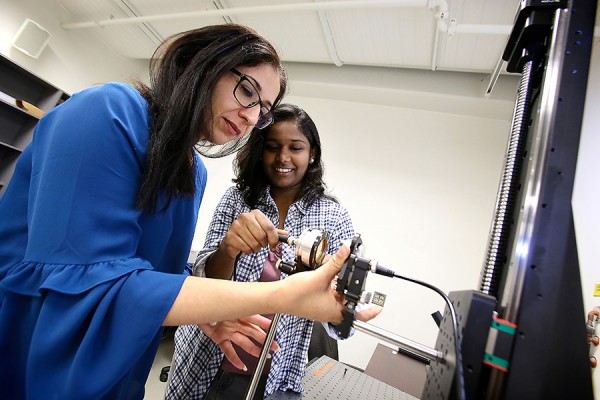 Professor Arezoo Emadi and grad student Jenitha Balasingam of the Electrical Micro and Nano Devices and Sensors Research Centre (e-Minds) adjust an ultrasonic imaging system for cancer detection.
Professor Arezoo Emadi and grad student Jenitha Balasingam of the Electrical Micro and Nano Devices and Sensors Research Centre (e-Minds) adjust an ultrasonic imaging system for cancer detection.
What if family doctors had access to low-cost, handheld scanners or biosensors that could detect cancer at an early stage? What if they could monitor a patient’s heart activity through a wearable device and detect early signs of cardiovascular disease? How about a sensor that could prevent intoxicated drivers from operating vehicles or a navigation system that could aid the visually-impaired indoors?
Researchers at the University of Windsor hope to advance these technologies and more in Windsor’s first state-of-the-art microfabrication facility. The high-tech clean room will be specially designed to facilitate multidisciplinary micro- and nano-scale research by controlling air pollutant levels, pressurization, temperature, and humidity.
It is slated to open in 2019 in the Ed Lumley Centre for Engineering Innovation.
“This fabrication facility will provide us with an ideal incubator for academia and industry to
foster collaborative research and commercialization of advanced sensors, thus increasing our leadership in the emerging area of the micro nano sensor industry — an area which is rapidly growing,” says Jalal Ahamed, an assistant mechanical engineering professor who designs and fabricates micro- and nano-systems for a variety of applications, including healthcare, automotive, aerospace and manufacturing.
“More and more devices are becoming smaller and smarter, so there is an increased need for finding innovative and cost- effective ways to miniaturize these sensors.”
Local companies have already shown interest in commercializing Dr. Ahamed’s personalized navigation system for the visually impaired and those in low-visibility environments. Unlike most navigation systems, which rely on a GPS satellite signal, Ahamed’s wearable smart device uses motion and acoustic wave sensors to detect nearby objects — the same way bats use sound waves to navigate.
Read more about other projects that will benefit from the facility on the Windsor Engineering website. The full article is featured in the 2018 issue of Windsor Engineering (WE).
